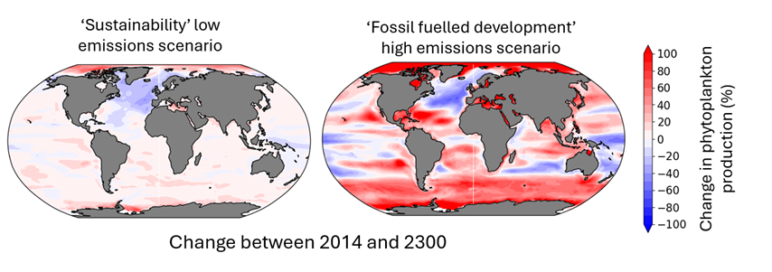Computer models of the ocean are used to tackle many different research questions in oceanography, especially where observations alone cannot unravel the complexities between the biological, chemical and physical interactions that occur below the surface. There is also one place that we absolutely cannot observe… the future! This is where models, in particular Earth System Models which capture the representations between land, atmosphere, ice and, of course, oceans, are a really important tool. They allow us to predict how the ocean might change in future, especially as climate change impacts many facets of the Earth system. Usually, these predictions are carried out until the end of the century (2100) under different climate change scenarios that describe our future society from ‘Sustainability’ with rapid emission reductions to ‘Fossil-fuelled development’ in which emissions continue to rise unchecked. The assessment of these scenarios are used to inform the Intergovernmental Panel on Climate Change reports.
One of the BIOPOLE project aims is to understand how future changes in the movement of nutrients out of the Polar regions may impact the global carbon cycle and fish abundance, as nutrients are critical for phytoplankton growth which are at the base of the marine food chain. One way we are addressing this aim is by using a subset of these Earth system model projections that were ran out past 2100 all the way to 2300 to understand the longer-term impacts. Assessing over this timescale is important as due to the slow nature of ocean circulation some consequences will not begin to appear until after 2100. Even under the ‘Sustainability’ low emissions scenario we see changes appearing after 2100 in global ocean phytoplankton production that may already be unavoidable due to the carbon emissions we have already emitted. We are keen to continue our analysis of these model projections to improve our understanding of the connectivity between the polar regions and the global ocean. By understanding how the ocean responds under different climate scenarios we can assess the potential impacts to the ocean carbon cycle and future fish abundance, which may have wide ranging implications.
The author of the article – Chelsey Baker (National Oceanography Centre)

